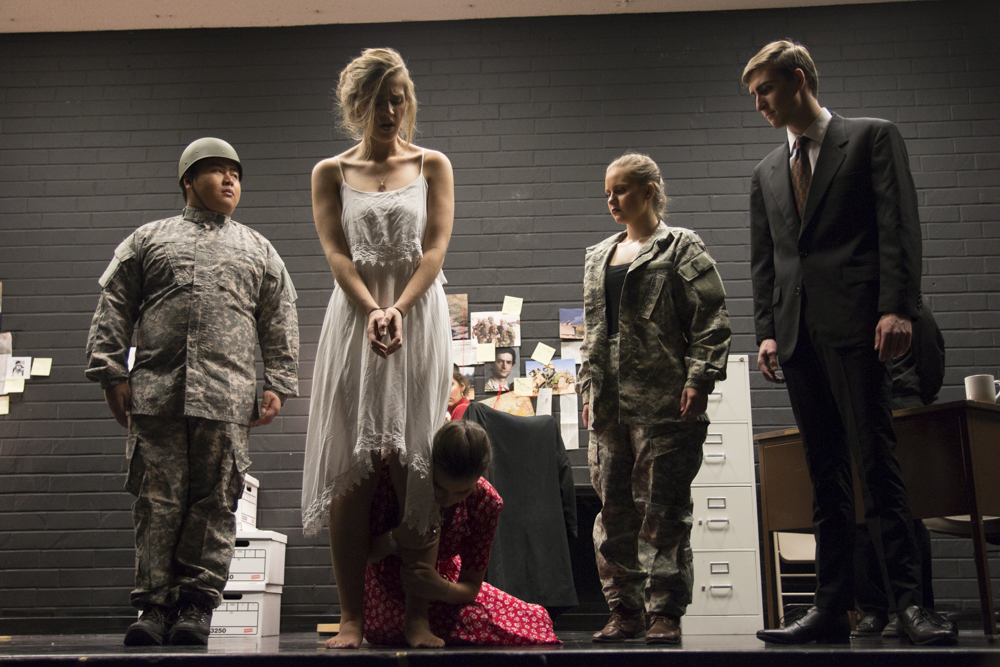Torrey Theatre presents the Greek tragedy “Antigone,” a gripping play about one woman’s actions in defiance of the law. Directed by Lauren Frey, junior English major, the production interprets the play in a modern setting of the Greek civil war during the late 20th century.
Universal Themes
Sophocles wrote “Antigone” in 441 B.C. as the third of his Theban plays. Despite the play’s ancient Greek setting, its content remains mostly free from political affiliation and assertions within Sophocles’ background. Instead, it focuses on universal themes of duty and morality, presenting an emotional conflict between the law of heaven and the law of the state.
“The reason why it’s such a timeless story, why it’s still around so many years later, is because there’s always going to be the question of faith and the question of civil law,” Frey said. “There’s always going to be that dichotomy no matter where you go, no matter who you are. It seems like it’s just a part of human nature.”
Antigone
The story follows a young woman named Antigone, played by Charlotte Stobbe, junior communication studies major, who wants to give her brother Polyneices a proper burial after his death in the war. Though her sister warns against it, Antigone feels that she acts in accordance with the gods’ decree. However, the ruler Creon, played by Ryan Reynolds, freshman chemistry major, bans such a burial in an attempt to establish peace, as Polyneices died a traitor and should not be memorialized. The plot becomes further complicated by the family ties that bind them, as Antigone is betrothed to Creon’s son Haemon. As tension builds, both Antigone and Creon struggle to understand the role they must play in their duties, their families and their society.
“I really admire Antigone’s resolve,” Stobbe said. “She has made up her mind that what she has to do is the right thing to do in the eyes of the gods and the justice of heaven. She sticks with that no matter what.”
Conflict of Passions
The play deals with a conflict of passions, reflected through the characters’ distinct motivations. Although one may identify more strongly with Antigone, who advocates for moral justice, or Creon, who advocates for civil unity, it is clear that neither of them are truly the hero or the villain.
“I want the audience to find a character to sympathize with and see themselves in, and understand both the good and bad in the character,” Frey said.
Consideration
As a tragedy, “Antigone” does not convey a singular theme but instead suggests the audience to consider the issues on their own terms. The play deals with passion, grief, honor and death, topics not always easily addressed.
“It’s not something we really like that much today. We don’t like tragedies, so it almost doesn’t make sense to want to do one,” Reynolds said. “But one of the things we found really cool was that tragedy is not really aiming precisely for a moral, or some truth you can directly apply to yourself. I think what a tragedy is really getting at is understanding.”
Regardless of Time Period
Rehearsals for “Antigone” began in February and continued with two to three practices a week. The 12-person cast consists entirely of Torrey students, each with varying levels of theatre experience. During rehearsals, they sought not only to memorize lines and learn about the play, but also to reflect deeply on the characters and ideas within it. Regardless of the time period, they felt the play reflected key themes that still exist in the world.
“For the first month of production, we were constantly talking about what our characters represented in current society,” said Derrick Keller, freshman English major in the ensemble. “I think the common misconception is to portray it as this period piece in togas… but I really appreciate this adaptation because it’s so helpful to be able to see things in a modern light, to think about how it applies today.”
Showing
“Antigone” will show in Mayers auditorium on April 28-29 at 8 p.m., April 30 at 2 p.m. and 8 p.m. and May 1 at 3 p.m. Tickets are available in the Torrey Office, outside the Caf or at the door for $5, cash only.







